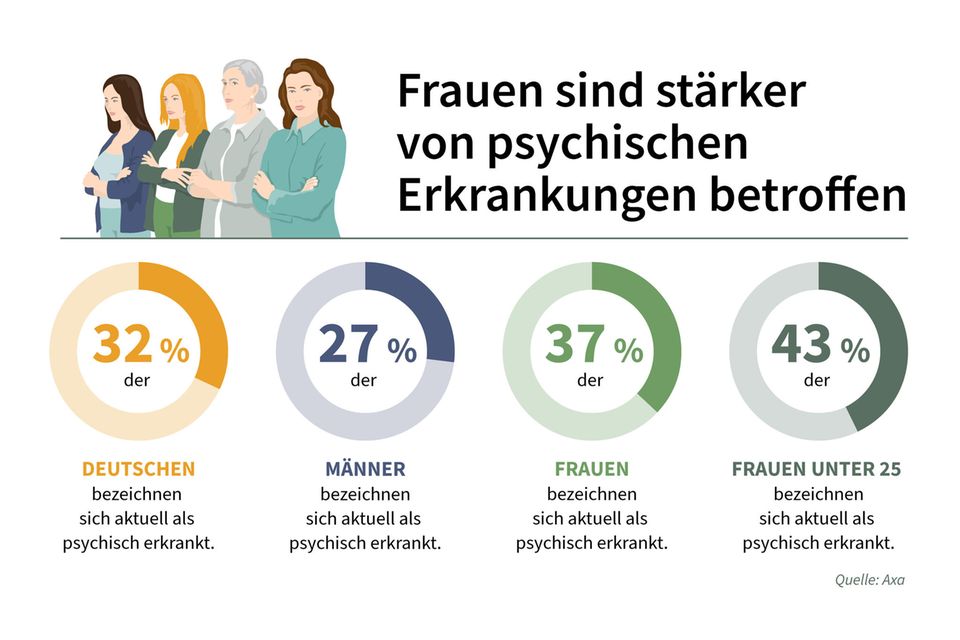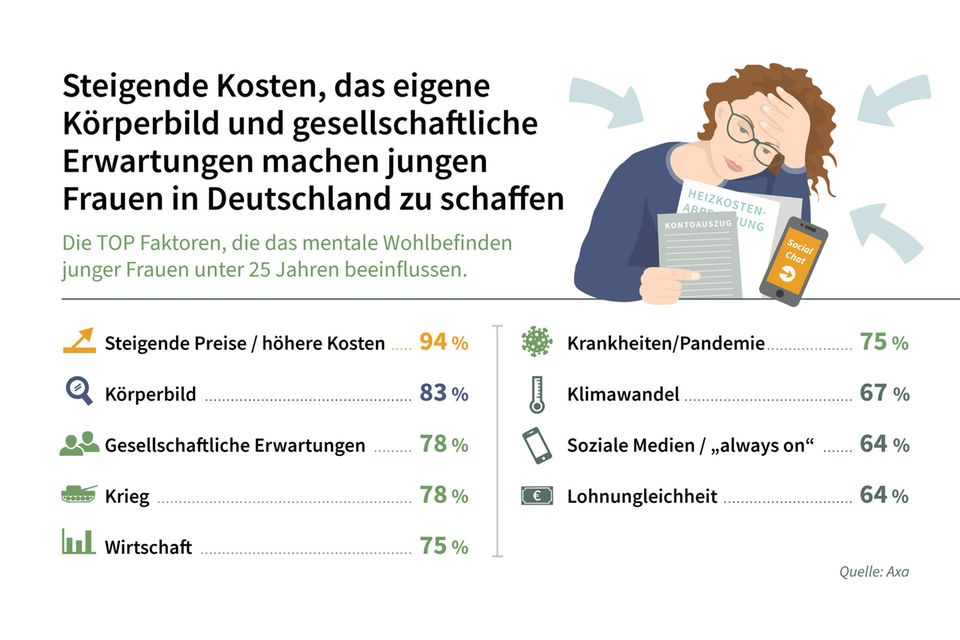health report
Almost every second young woman has a mental illness
© Olena Panasovska / Adobe Stock
AXA Versicherung published its Mental Health Report 2023 today. The results are frightening. More and more young women in particular are suffering from mental illnesses.
Mentally stressed, especially women
41 percent of 18 to 34-year-old women in Germany say they are currently mentally ill. That comes from the third AXA Mental Health Report for which the opinion research institute Ipsos surveyed 2,000 people between the ages of 18 and 74 in Germany about their mental health. In addition to Germany, results were determined in fifteen other countries from Europe, Asia, North and South America. The international study aims to raise awareness of the possible risks of mental illness – also in connection with the current crises.

© AXA Insurance
Young women in particular are increasingly suffering from depression, anxiety disorders, eating disorders, obsessive-compulsive disorders or other mental illnesses. Almost every second woman under the age of 35 is affected. On a national average, around one in three (32 percent) states that they are currently suffering from a mental illness. With these results, Germany and Great Britain (32 percent) are the sad frontrunners compared to other European countries, while in France, for example, every fifth person is affected.
Social media and a problematic relationship with one’s own body have a negative impact on well-being
In Germany, it is above all the rising prices (89 percent), the war (81 percent) and the state of the economy (76 percent) that have a negative impact on the well-being of the population. However, it is also striking that three quarters of the under-35s state personal factors such as problems with their own body image (75 percent) and social expectations (75 percent) as important factors influencing their emotional state. In addition, 63 percent of 18 to 24-year-olds stated that social media and being “always on” on the internet were not good for them emotionally.
“The current mental state of our society gives cause for concern. The simultaneous crises have left their mark on the population – especially among young people.”
That says Karsten Dietrich, director of personal insurance at AXA Germany in the press release.

© AXA Insurance
The stigma surrounding mental illness is decreasing
However, the study also shows a positive trend. While mental illnesses were taboo for a long time, openness to the topic is growing, especially among the younger generation. 38 percent of 18- to 24-year-olds say the stigma attached to mental illness has decreased. In an overall comparison, 24 percent of all respondents agree with this statement. Among the 44 to 74 year olds it is significantly less (17 percent).
Older people least mentally ill
The 65 to 74 year olds seem to be the least mentally stressed. Only 17 percent stated that they were currently mentally ill. Compared to 18-24 year olds, what is striking is that the vast majority of this age group agree that they feel good about themselves and are proud of what they have achieved in life so far (70 percent). This may be due to the greater life experience, but possibly also to the lesser involvement with the topic or the greater stigmatization of mental illnesses in this age group.
Future forecasts rather bleak
When it comes to looking to the future, the majority of Germans are rather pessimistic about the future. In comparison, at 47 percent, it is the younger people who are more hopeful. When asked about a wish to improve their own lives, the young adults named “finding the perfect job” as the top priority (19 percent). This is followed by “mental health” (18 percent), “physical health” (15 percent) and “wealth” (15 percent). The youngest age group surveyed is the only one to name mental health ahead of physical health.
Self-diagnoses on the Internet are increasing
The number of people who self-diagnosed their mental illness via the Internet has increased from 12 to 16 percent compared to the previous year. Among the 18 to 24 year olds it is even 40 percent – and thus almost as many as those who have had their illness diagnosed by a psychiatrist or psychologist (41 percent). Every fourth of them (25 percent) states that the disease is not treated professionally, but is managed through self-help. It is particularly alarming that almost every third affected person between the ages of 18 and 24 (32 percent) is currently not receiving any treatment.
